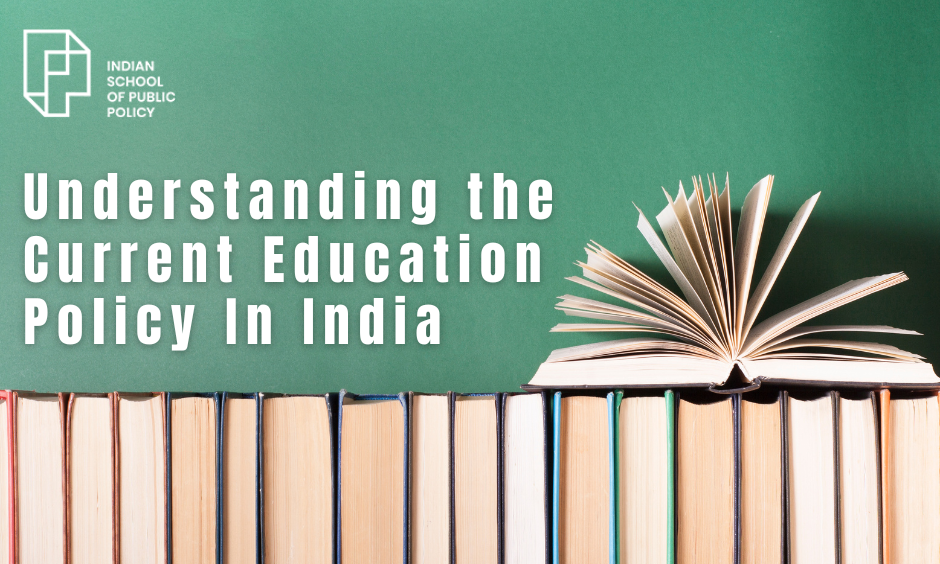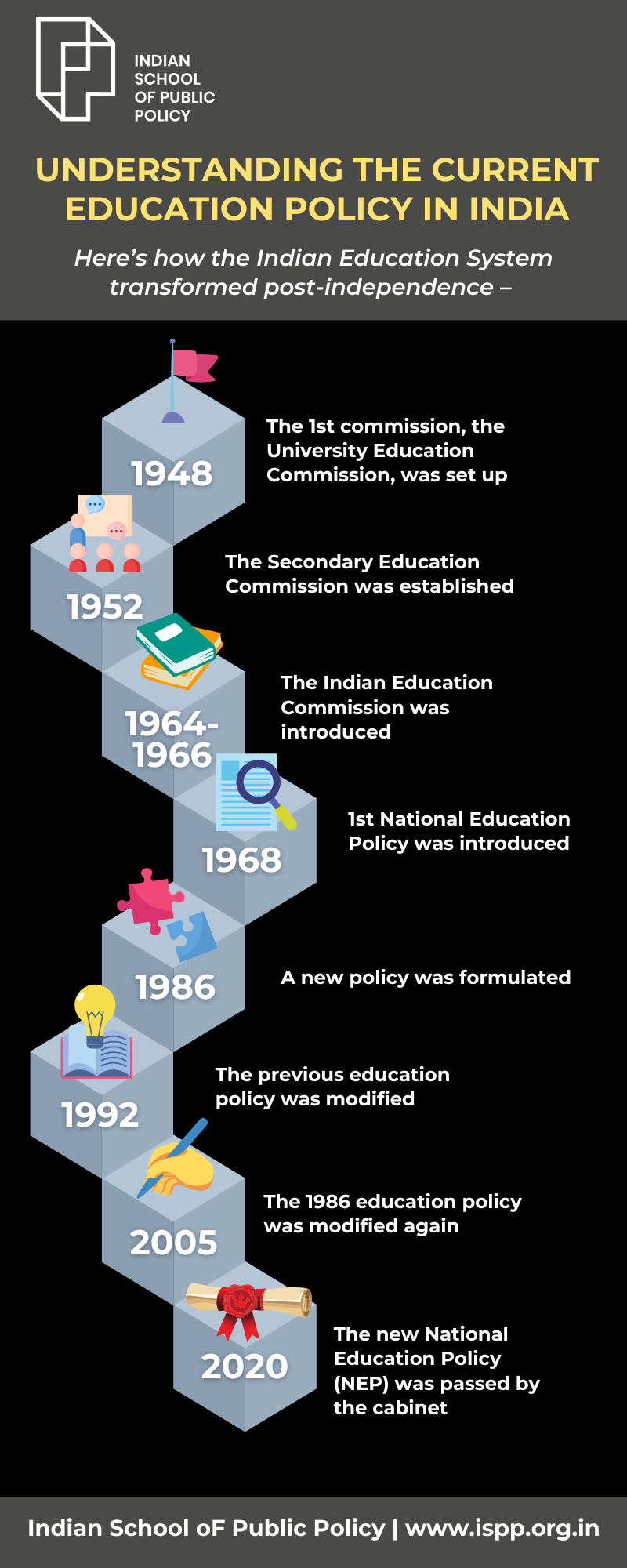
Understanding The New Education Policy In India

Define National Education Policy | New Education Policy 2020 (NEP 2020) Pitfalls | New Education Policy 2023 NEP 2023 | PDM By ISPP | Student Testimonials | FAQs
What is the National Education Policy and its Transition to the New Education Policy?
A group of experts, led by former ISRO chief K Kasturirangan, talked about the challenges and changes needed to build an education system that helps transform our country by providing excellent education to everyone. Its goal is to turn India into a global knowledge superpower. This included aspects from school to college to hiring. The Ministry then reviewed and approved these suggestions.
Here’s how the Indian Education System transformed post-independence –
1948 – The 1st commission, the University Education Commission, was set up
1952 – The Secondary Education Commission was established
1964-1966 – The Indian Education Commission was introduced
1968 – 1st National Education Policy was introduced
1986 – A new policy was formulated
1992 – The previous education policy was modified
2005 – The 1986 education policy was modified again
2020 – The new National Education Policy (NEP) was passed by the cabinet
Pitfalls In The New Education Policy 2020 (NEP 2020)
- Increased Pressure and Competition for Students
The policy may heighten student pressure with a strong focus on standardised exams, risking overall well-being.
- Narrowing of Subject Choices
Emphasis on vocational education may limit subject options, affecting intellectual and creative growth.
- Insufficient Teacher Training and Support
The policy lacks clear guidelines for teacher training, potentially impacting the quality of education.
- Imbalance in Digital Infrastructure
The policy’s emphasis on digital education reveals a digital divide, disadvantaging economically challenged students.
- Standardisation Challenges
A nationwide standardisation approach may overlook regional diversities, affecting unique student needs.
- Insufficient Implementation Strategy
The policy lacks a clear execution plan, risking confusion and uneven implementation across the country.
While the New Education Policy 2020 brought about positive transformations in the Indian education system, stakeholders were required to work towards a new education policy that fosters holistic development, inclusivity, and equal opportunities for all.
This led to the introduction of
The New Education Policy 2023 (NEP 2023)
The Modi government has introduced a new education policy, and a significant change is the elimination of the 10 + 2 structure. The traditional educational curriculum in our country followed a 10 + 2 system, but now it will transition to a 5 + 3 + 3 + 4 structure. This new arrangement signifies the first part covering primary to second grade, the second part for third to fifth grade, the third part for sixth to eighth grade, and the final part for ninth to 12th grade.
Highlights of the new education policy 2023 (NEP 2023)
1. Extended Schooling Period
The New Education Policy (NEP) mandates compulsory schooling from ages 3 to 18, introducing three years of pre-schooling for children aged 3-6. The curricular structure shifts from 10+2 to 5+3+3+4, emphasising Early Childhood Care and Education (ECCE).
2. Medium of Instruction
NEP emphasises native languages for teaching, suggesting the use of the mother tongue until at least Grade 5 and preferably until Grade 8. It encourages multilingualism, respecting the three-language formula.
3. Higher Education Reforms
The Higher Education Commission of India (HECI) will oversee all higher education, excluding medical and legal education. It aims to phase down college affiliation in 15 years, providing graded autonomy to colleges.
4. The blurring of Subject Distinctions
NEP eliminates formal distinctions between arts and sciences, curricular and extra-curricular activities, and vocational and academic programmes. Students can choose from various disciplines, and vocational education starts in the sixth grade.
5. Flexible Undergraduate Degrees
Undergraduate degrees will last three or four years with multiple exit options. An Academic Bank of Credit will store earned credits digitally for transferability, and vocational courses will be integrated into the curriculum.
6. Universal Access to School Education
NEP focuses on universal access, holistic development, and progress tracking for students. It incorporates vocational education from pre-school to 12th standard and emphasises the inclusion of counsellors and social workers.
7. Foundational Literacy and Numeracy (FLN)
NEP aims to achieve FLN starting from Grade 3 by 2025, focusing on reading and basic numerical skills as prerequisites for learning.
8. Experiential Learning
The policy promotes experiential learning, critical thinking, and reduced course content in the school curriculum. Vocational education is introduced in grades 6-8, accompanied by internship opportunities.
9. Increase in Graduate Enrollment Ratio
NEP targets a 50% graduate enrollment ratio by 2035, with multiple exit options expected to reduce student dropout rates.
10. Enhancement of Open and Distance Learning
The policy aims to improve the standards of distance learning, introducing measures like online courses, digital repositories, and credit-based recognition of Massive Open Online Courses (MOOCs).
11. Technological Innovation
The establishment of the National Educational Technology Forum (NETF) is proposed to promote technological innovation in education, enhancing classroom processes and teacher development.
12. Internationalisation of Education
NEP encourages global collaborations, allowing institutions to form partnerships with foreign universities and supporting faculty exchange programmes.
13. Increased Public Investment
The Centre and State governments will collaborate to increase investment in education, aiming to reach 6% of GDP to enhance educational infrastructure.
The new education policy addresses the problems in the Indian education system and aims to connect vocational and formal education.
| Wondering who understands the intricacies and gravity of the situation and helps to curate policies that are better aligned with the end users? Of course, it’s the highly skilled policymakers! Qualified policymakers possess the expertise to analyse complex issues, make informed decisions, and formulate effective policies. Their knowledge helps them navigate intricate challenges, consider diverse perspectives, and implement solutions that address societal needs. They contribute to the creation of well-informed, sustainable, and impactful policies, shaping positive outcomes for communities and promoting long-term societal development. |
Interested in gaining such expertise?
Check this out!
The Indian School of Public Policy
The Indian School of Public Policy (ISPP) is a collaboration of top policymakers, experts, and influencers. It aims to transform policymaking by connecting with industries, having a globally renowned faculty, and adopting an innovative approach. The flagship offering is the Post Graduate Programme in Public Policy, Design, and Management, a year-long course divided into seven terms, each lasting seven weeks. This immersive programme empowers students to understand public policies deeply, equipping them with the skills needed to excel as proficient policy analysts and executives. The course covers key areas like public policy, finance, ethics, and public administration.
Programme Objectives
During the programme, students analyse policies, create new ones, and learn how to make a real-world impact. They consider factors like financial feasibility, necessary skills, and ethical principles. The programme focuses on finding the best strategies for implementing policies, efficient management, and thorough evaluation in the field of public administration and policymaking.
Take a peak into the class profile 2023.
Check out the PDM programme highlights!
- Harris Uchicago – Certificate In Public Policy
- Immersive Learning Projects
- Interactive Labs
- Career Support & Placements
- Tea & Policy
Register your Interest to Study at ISPP
Student Testimonials
Our student ambassadors, including alumni and current students, have a lot of knowledge about public policy. They’re here to answer any questions you may have. Whether you want information about our programmes, details about the admissions process, insights into campus facilities, or a peek into student life, our student ambassadors are here to help and provide assistance.
FAQs
What is the National Education Policy (NEP)?
NEP is a comprehensive initiative by the Indian government to reform the education system, aiming at holistic development, inclusivity, and equal opportunities.
What are the key pitfalls in the NEP 2020?
Pitfalls include increased student pressure, narrowing of subject choices, insufficient teacher training, digital infrastructure imbalance, standardisation challenges, and an insufficient implementation strategy.
What changes does the new NEP 2023 bring?
NEP 2023 introduces reforms such as an extended schooling period (ages 3-18), a shift in curricular structure, emphasis on native languages, higher education reforms, blurring of subject distinctions, flexible undergraduate degrees, universal access to school education, foundational literacy and numeracy, experiential learning, increased graduate enrollment, open and distance learning enhancement, technological innovation, internationalisation of education, and increased public investment.
Why is skilled policymaking crucial for education reforms?
Skilled policymakers analyse complex issues, make informed decisions, and formulate effective policies. Their expertise navigates challenges, considers diverse perspectives, and ensures well-informed, sustainable, and impactful policies, contributing to long-term societal development.
How does the new education policy address problems in the Indian education system?
The new education policy addresses issues by connecting vocational and formal education, introducing flexible structures, promoting experiential learning, enhancing technological innovation, encouraging international collaborations, and increasing public investment to improve educational infrastructure.
Infographic



